Depression and anger are two of the most common emotions that people experience. Unfortunately, many people do not know how to deal with these emotions in a healthy way. In this blog post, we will discuss the causes of depression and anger and provide some tips on how to manage these emotions.
Contents
Defining Depression And Anger
 Depression and anger are both considered negative emotions. Depression is more commonly known as sadness or feeling blue. Anger is often expressed as frustration, irritability, or annoyance. While both of these emotions are normal human experiences, they can become problematic when they’re experienced in excess.
Depression and anger are both considered negative emotions. Depression is more commonly known as sadness or feeling blue. Anger is often expressed as frustration, irritability, or annoyance. While both of these emotions are normal human experiences, they can become problematic when they’re experienced in excess.
Moreover, when someone is experiencing depression, they may also find themselves feeling angry more easily or excessively. This can be confusing and frustrating, as it can feel like you’re constantly cycling between two negative emotions.
Depression and anger are both emotions that everyone experiences at some point in their life. However, when these emotions are felt in excess, they can become problematic. Depression is more commonly known as sadness or feeling blue, while anger is often expressed as frustration, irritability, or annoyance.
It’s important to understand the difference between these two emotions so that you can better deal with them when they arise.
Link Between Depression And Anger
It is often believed that anger is a secondary emotion to depression. And while it is true that anger can be a symptom of depression, the two emotions are actually linked. Research has shown that people who are prone to anger are also more likely to experience episodes of depression.
The connection between anger and depression makes sense when you consider the fact that both emotions involve a sense of loss. When you are angry, you may feel like you have lost control of a situation. And when you are depressed, you may feel like you have lost something important, such as a job or a relationship.
Both conditions have similarities and differences, some of these are listed below:
Similarities
The similarities between anger and depression include:
- Both emotions can be caused by a sense of loss.
- Both emotions can lead to feelings of isolation and loneliness.
- Cause physical symptoms, such as headaches or stomachaches.
Differences
The differences between anger and depression include:
- Anger is usually directed at someone or something. Whereas depression is not.
- Depression can last for weeks or months, while anger is usually short-lived.
- Anger is often accompanied by a desire to take action. While depression is characterized by a feeling of helplessness.
If you are struggling with either of these emotions, it is important to seek help from a mental health professional. They can help you to understand the root cause of your feelings and develop a treatment plan to address them.
Can Anger Be A Sign Of Depression?
 The recent study of DSM-5 does not list anger as a sign of depression among others. So, scientifically it is not a sign. However, people who experience depression often report that anger is one of their most prominent symptoms.
The recent study of DSM-5 does not list anger as a sign of depression among others. So, scientifically it is not a sign. However, people who experience depression often report that anger is one of their most prominent symptoms.
In fact, it is believed that anger can manifest with depression in several ways. These include:
Feeling annoyed
This is often the first sign that something is wrong. You may find yourself getting irritated over things that never bothered you before. And you might react like this:
- get impatient with people
- yell more
- have a shorter fuse
In fact, feelings of irritation and annoyance might combine with a sense of hopelessness and depression.
Hostility
This term is usually used to describe a negative attitude towards others. It involves:
- feeling angry,
- sarcastic comments,
- unfriendly behavior,
- resentful, and
- having a general dislike for someone.
In some cases, hostility can also lead to violent and aggressive behavior. If you find yourself feeling hostile towards someone, it’s important to try and understand why. Is there something about this person that’s making you feel this way?
Anger attacks
It is often believed that anger attacks are caused by a combination of anger and depression. These attacks affect your personality and cause you to overreact to situations. Many people who suffer from anger attacks also have a history of depression. This situation will make you feel like you are not in control of your emotions and can be very frustrating.
So, these are some common ways through which your anger can manifest with depression.
Causes Of Anger In Depression
 There are many possible causes of anger in people who are depressed. Some of these include:
There are many possible causes of anger in people who are depressed. Some of these include:
Gender
Although people of any gender can experience anger, depression, and anxiety, some research indicates that men are more likely to externalize their frustration by becoming angry. Whereas women are more likely to internalize their frustration and become depressed.
More often gender norms that are defined by society may play a role in the way men and women express their emotions. But, men usually choose different ways to cope instead of sharing their feelings. They might choose:
- bottle up their emotions
- become aggressive or violent
- withdraw from people and activities they once enjoyed
- use alcohol and other substances
All of these coping mechanisms can make it difficult for men to express what they’re really feeling inside and may cause them to lash out in anger.
Age
Age can also be a factor in how likely someone is to experience anger. For example, younger people are more likely to report feeling angry than older people. Your child or teenager might get angry more easily than you do. The anger and irritation can burst especially if your child also:
- less interested in doing activities they once enjoyed
- more irritable or grouchy than usual
- has trouble sleeping or sleeps too much
- eats more or less than usual
- experiences physical symptoms, such as headaches or stomachaches
- focuses on negative things more easily than positive things.
You might be wondering why your child is angry all the time. There are many possible explanations, such as:
- hormone changes during puberty
- feeling overwhelmed by schoolwork or extracurricular activities
- trying to fit in with peers
- dealing with bullying or other social issues.
Co-occurring Conditions
 Sometimes, anger is a symptom of another underlying condition. For example, people with depression often report feeling angry. In fact, anger is one of the most common symptoms of depression. Other conditions that might be linked to anger include:
Sometimes, anger is a symptom of another underlying condition. For example, people with depression often report feeling angry. In fact, anger is one of the most common symptoms of depression. Other conditions that might be linked to anger include:
- anxiety disorders
- substance abuse disorders
- personality disorders
- post-traumatic stress disorder (PTSD)
Other Causes
There are some other possible causes of anger, such as:
- overwhelmed by life and its demands
- feeling like you’re not good enough or that you can’t do anything right
- trapped, helpless, and hopeless
- rejected, alone, and misunderstood
- lack of sleep
- fatigue
Anger can also be caused by environmental factors, such as:
- noise pollution
- traffic jams
- crowded places.
It’s important to remember that everyone experiences anger differently. What might trigger one person’s anger might not trigger another person’s anger. It’s also important to remember that anger is a normal emotion. It’s only when it starts to interfere with your life in a negative way that it becomes a problem.
Professional Treatment Options
It is important to seek professional help if your condition is interfering with your ability to function day-to-day. A therapist can provide you with the tools and resources necessary to manage your symptoms and live a healthy life. Also, there are times when medication is necessary to stabilize your mood. Let’s discuss in detail:
Therapy
There are many different types of therapy available, so it is important to find one that is right for you. If you are struggling with depression and anger, consider therapy as per your condition. Some of the therapy recommendations could be:
- Cognitive-behavioral therapy: This type of therapy can help you identify and change negative thought patterns.
- Interpersonal therapy: This type of therapy focuses on your relationships and how they may be affecting your mood.
- Psychodynamic therapy: It explores the role of past experiences in shaping your current behavior.
So, these three types of techniques are highly recommended for depression and anger. You can try Mantra Care for the best results. It is a platform that provides mental health services online by matching you with a licensed therapist.
Medication
 Depression and anger are often treated with medication. If you are struggling with these emotions, your doctor may prescribe an antidepressant. Antidepressants can take several weeks to work, so it is important to be patient. In some cases, other medications may be necessary to stabilize your mood. If you are taking medication, it is important to follow your doctor’s instructions and attend all scheduled appointments.
Depression and anger are often treated with medication. If you are struggling with these emotions, your doctor may prescribe an antidepressant. Antidepressants can take several weeks to work, so it is important to be patient. In some cases, other medications may be necessary to stabilize your mood. If you are taking medication, it is important to follow your doctor’s instructions and attend all scheduled appointments.
Moreover, you should be aware of the side effects of the medication. Some common side effects include:
- Dry mouth
- Nausea
- Headaches
- Drowsiness
- Weight gain or loss
You should talk to your doctor if you experience any of these side effects. With proper treatment, you can manage your depression and anger. You deserve to live a happy and fulfilling life.
Helpful Tips To Deal With Depression And Anger
There are two emotions that can really take a toll on our lives, depression, and anger. They can make us feel like we’re not in control and often leave us feeling exhausted. If you’re struggling to deal with these emotions, here are some tips that may help.
It is essential to share your feelings with someone you trust, whether it is a friend, family member, therapist, or counselor. Talking about what you’re going through can help you to feel better. And may also give you some insight into what is causing your emotions. Moreover, sharing your thoughts is believed to have a positive effect on your mental health.
Get active
Exercise is a great way to boost your mood and ease tension. It releases endorphins, which are known to have a positive effect on our emotions. Even if you don’t feel like working out, going for a walk can be helpful. More often, exercise is believed to be an effective treatment for depression.
Eat a healthy diet
What we eat can have a significant impact on our mood. Eating unhealthy foods can make us feel sluggish and down while eating healthy foods can give us energy and improve our mood. Be sure to include plenty of fruits, vegetables, and whole grains in your diet. Also, limit your intake of caffeine and alcohol.
Get enough sleep
 Sleep is crucial for our overall health and well-being. When we don’t get enough sleep, we can feel irritable and moody. Aim to get at least eight hours of sleep every night. If you have trouble sleeping, there are a few things you can try such as avoiding caffeine in the evening, establishing a bedtime routine, and creating a relaxing environment in your bedroom.
Sleep is crucial for our overall health and well-being. When we don’t get enough sleep, we can feel irritable and moody. Aim to get at least eight hours of sleep every night. If you have trouble sleeping, there are a few things you can try such as avoiding caffeine in the evening, establishing a bedtime routine, and creating a relaxing environment in your bedroom.
Write down your thoughts and feelings
Putting your thoughts and feelings into words can be very cathartic. Writing can help you to make sense of what you’re going through and can also be a way to express your emotions. You don’t have to be a great writer to benefit from this activity. Just writing down whatever comes to mind can be helpful.
Practice meditation and mindfulness
While in depression and anger we often dwell on negative thoughts, meditation and mindfulness can help us to focus on the present moment. This can be a difficult task, but there are plenty of resources available to help you get started. Taking just a few minutes out of your day to focus on your breath can make a big difference. And, it is the safest and most effective way to deal with depression and anger.
If you’re struggling with depression and anger, know that you’re not alone. These emotions are common, but they can be very tough to deal with. However, there are things you can do to ease your symptoms. Be sure to try some of the tips listed above.
Conclusion
To conclude, depression and anger are two very common emotions that people experience. It is important to remember that these emotions are normal and there are ways to deal with them. In fact, some research suggests that experiencing these emotions can actually create problems in leading our normal life. So, if you are feeling depressed or angry, don’t hesitate to seek help from a professional.
For more information, please contact MantraCare. Depression is a mental illness characterized by persistent feelings of sadness, hopelessness, and loss of interest in daily activities. If you have any queries regarding Online Depression Counseling experienced therapists at MantraCare can help: Book a trial Depression Therapy session


